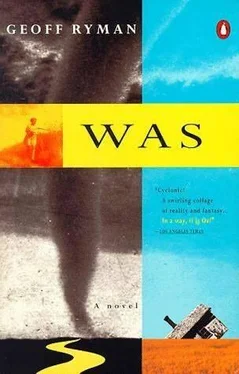She was smiling, beaming, and she held up both hands in triumph, both arms raised so that all the class could see the welts and the blood.
"What are you going to do now?" she asked them in a silky voice she had learned from the teachers. "There's nothing they can do to me. There's nothing any of you can do to me."
The class and Mr. Clark understood then that they had created a monster. And monsters have to be appeased.
Little Emma, the ally, had been whipped into line. She had learned never to tease Dorothy again and she knew that she was nothing without Dorothy. The second Fury was more than content to be Dorothy's lieutenant. And the teacher and the class let the Furies talk, and they let the Furies laugh. Angela began to lose power. Mr. Clark was helpless. Teaching became impossible. He dreaded going into the classroom. He knew he had failed the children, failed to protect them, and they saw no reason now to take him seriously. They all began to call him Clark, last name only. He became ill.
That's how they got the Substitute Teacher. The children knew the Substitute was not a real teacher because he was so soft. He had a round and smiling, handsome face, and he was young, only about ten years older than them. He had a lovely voice, very warm and soft and beguiling, and his movements were small and neat and quick. He wore a straw boater. He was like nothing the children of Kansas had seen.
He was, it turned out, an actor from New York. He told them about a play he had written called The Maid of Arran and he was touring with it and playing the lead role.
"Of course," he chuckled, "the handbills can't say written and directed and starring all the same person, so the posters say that the actor is called George Brooks."
What is your name? What is your name? all the children asked in chorus.
He chuckled, pleased. "Frank," he said.
You couldn't call a teacher by his first name!
"No!" the class chorused, laughing. "What's your last name?"
He told them, and Dorothy misheard. She thought his last name was Balm. Frank Balm. It was a meaning name.
"Honest Ointment!" shouted Larry Johnson, as if it were a quack medicine, and the actor bent forward with laughter.
"The original and genuine article. Every bottle is signed," grinned the Substitute. He sounded just like a hawker.
He lit a cheroot. In class, he lit a cigar. He sat on the desk and crossed his legs at the ankles, and he leaned back to let a serpent of cigar smoke rise up from his lips. There was a frisson of real excitement from the class, and the children looked at each other, eyes goggling.
"My other occupation," he continued, satisfied with the progress of the smoke, "was inventing chickens. I would breed new kinds of hen. My hens won awards. I even wrote about them. My new kind of Hamburg hen." He made a certain motion that may have been like a hen, or like something else. The children weren't sure what, except that it looked a little racy and made them laugh.
The Substitute had dash. He smelled of New York, he smelled of money, and he didn't care that teachers weren't supposed to smoke. He was small, what the children called a squirrel, but he was a nice squirrel. An unspoken agreement passed in silence around the class. As long as he doesn't try to make us do anything stupid, we'll be nice to this one.
Dorothy fell in love with him. My parents were actors, she wanted to tell him. They were like you.
She whispered the name to herself, all the way home. Frank, she thought, Frank, Frank, as her uncle put his hands on her and then moved them away again in fear. In summer evenings, there was too much light; they could be seen from too far away. Sometimes Uncle Henry didn't do anything, except smile and pat her knee. Tonight was one of those nights. All the trees seemed to whisper in gratitude. Could she plant a tree and call it Frank?
Frank, she whispered as she fried sausages. She thought of his smooth hands, his one clean suit, his funny hat, his groomed moustache, his light and pleasing tenor voice. She thought of his kind and handsome face. His name seemed to sum up everything that was missing from her life.
Frank, she thought, as she lay down that night. She thought of him, and she thought of her own unworthiness, and tears stung the lower edge of her eyes. It was as if she were in a boat cast adrift, never to come ashore to some green and happy land, where people laughed and everything was beautiful. She herself had cast the boat adrift, and there was no going back. Now she would never get home. Now she would never be where Frank was. He was too good for her. She began to hate him just a little. And said his name again.
The next day, the Substitute brought in a thick red book.
"How many of you," he asked them, "can speak Ottoman Turk?"
The class looked back at him in silence.
"Well, this is a book called the Redhouse Osmanli-English Dictionary , and it tells me what words are in Turkish. How many of you know anything about Turkey?"
Stupid question.
"Uh-you eat them at Thanksgiving," said Larry Johnson. The class laughed, somewhat shyly, because they knew they were ignorant. The Substitute smiled, too, lightly, happily.
"Turkey is a wonderful country," said the Substitute, his blue eyes going pale with wonder. "The Turks worship in huge domed buildings called jamis , bigger than any cathedral. Vast domes, with pigeons flying around inside and carpets on the floor and fountains where the faithful wash before worshiping. They have wonderful tiles on the walls, all blue and green. And the sultans have many wives and many concubines, so many that they all live together in beautiful prisons which no man may enter-or he'll be killed. In the palaces there are special fountains where executioners wash their swords."
This was very racy stuff indeed. The class was fascinated.
"Ask me a word in Osmanli," he whispered.
There was a shuffling and a shrugging of shoulders and birdlike exchange of nervous giggles.
"What's the word for sunflower?" asked Angela, who was brave.
"Moonflower," said the Substitute promptly, smiling with anticipation. He didn't have to look it up.
The class laughed, partly in relief that this was going to be fun, and partly from the pleasant strangeness of another language. It was like a mirror that reflected things backward.
"They pronounce it 'aychijayee,' " he said and turned and wrote it on the blackboard. "It's the Arabic alphabet," he explained.
They asked him the word for hen and the word for school. Dorothy Gael put up her hand.
"What's the word," she asked, shyly, "for home?"
The Substitute blinked and then his face went soft. Just answer the question, thought Dorothy.
"Ev," said the Substitute. "Ev means 'home.' "
"What's your name in Turkish?" asked Larry Johnson, grinning.
The Substitute smiled, spun smartly on his heel and wrote, without hesitation. Then he pronounced the word.
The class laughed in unison. "Ooze?" they asked.
He made a kind of embarrassed swallowing gesture. He pronounced it again. This time it sounded more like "Uz." "It means 'frank' in Turkish. And Frank's my name. It means a lot of other things as well. It means 'real and genuine.' It means 'pure and unadulterated.' It means 'kernel and cream,' and it means 'self.' It's the root word for 'yearning' and for 'homesickness' and for all the things that people want. It also happens to be the original name of the Turks. They were a tribe called the Uz, or the Uzbecks. Or the Oz, and they came out of the wilderness."
Dorothy was suddenly hauled out of herself by a gust of childish interest. "You mean like the Indians?" she blurted out, her voice loud and lacking in grace.
The class laughed until the Substitute, the full power of his smile trained on Dorothy, said, "Very like the Indians. They were desert nomads who lived in tents. They came out of the East and the North, they came out of the desert, and they conquered the Greeks and they conquered the Arabs. Turkey is a country where the Indians were the settlers. The Indians won."
Читать дальше












